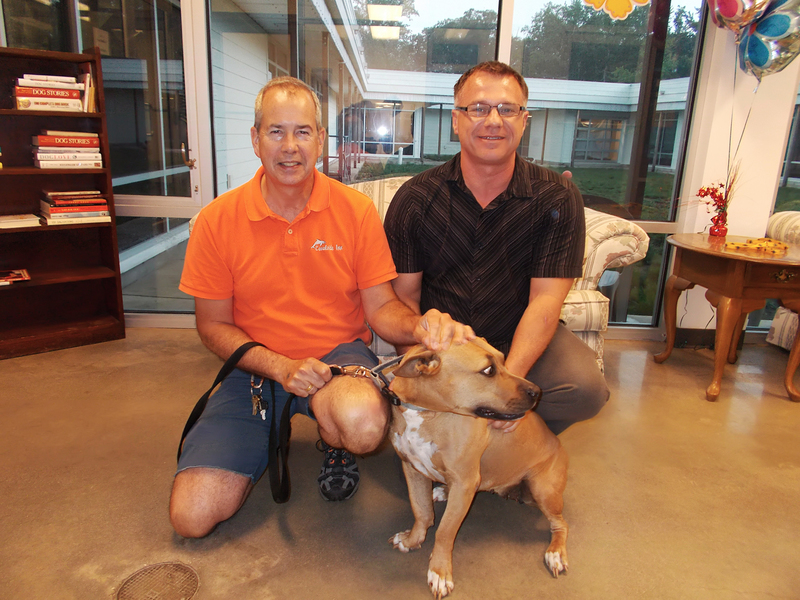Safe Haven Animal Sanctuary is running out of money.
The no-kill shelter is operating on a tight budget, but it will run out of money at the end of the month, say shelter officials.
Officials say they underestimated the number of abandoned animals and the difficulty of getting them adopted. New board member Rich Garrett said the shelter may have to close its doors if it cannot raise $200,000.
"We are paying a lot to kennels for dogs that we don't have space for at the shelter," Garrett said. "We are up against a big challenge to keep the doors open and the lights on."
Board member Rick Kirchhoff said the shelter was not prepared for the influx of animals and the associated costs.
When the shelter opened last year, it received an $800,000 donation from the estate of a no-kill supporter. Kirchhoff said that money paid for the first year of operation, but is now gone.
Money from the Kent County dog-control contract must be used for Kent County dogs and cannot go to fund the building or other abandoned animals, he said.
Safe Haven Interim Director Cindy Woods said board members have not discussed what they will do about the Kent County contract if the shelter has to close its doors. She expects Safe Haven will continue to fulfill the contract, working with Animal Inn, a kennel in Kent County. She said the board's goal is to keep the shelter's doors open.
Kent County Administrator Michael Petit de Mange did not return calls for comment.
Garrett, other board members and shelter volunteers sent out letters to past donors asking for money.
"The board paid for the mailing and the volunteers helped put it together," Garrett said. He also sent out emails to friends and family seeking donations.
Since its opening, Safe Haven officials have found numerous abandoned animals at its front gate on Shingle Point Road. In some cases, cats were taped into boxes and left.
"We underestimated the volume of animals and the big challenge of getting them adopted," Kirchhoff said.
In addition to more than 100 cats at the shelter, officials are also responsible for more than 200 dogs, many of which are pit bull mixes.
"A lot of these dogs are great and sweet, but the public doesn't have warm and fuzzy feelings for them," Kirchhoff said.
In the past few months, the shelter has worked hard to increase adoptions, said interim executive director Cindy Woods.
"We are trying to educate the public, but it is more challenging to adopt out pit bulls," she said. "The shelter is over-filled."
Each dog at shelters in Kent and Sussex counties costs $10 a day. Many dogs also need medical attention, which adds more costs, Woods said.
The shelter is committed to its no-kill philosophy and works hard to give each dog a good life. This month, the Dollars for Dusty campaign aims to raise $6,000 to pay for surgery for a dog with a tumor pressing on his spine. So far, more than half of the money has been raised, Woods said.
The recent Paws for a Cause event was also successful, raising $35,000, Kirchoff said. Still most of the good news is out-weighed by the monthly operating costs, which Kirchhoff estimates are around $125,000.
He said board members are now conducting a top-to-bottom financial audit to determine where costs can be cut.
"We are working with our no-kill network and hoping to move about half the population of our dogs out to other shelters and fosters," Kirchhoff said. "Then we hope to stabilize our population at about 100 dogs."
To do this, shelter officials must balance adoptions with intake, something they have so far been unable to do.
Kirchhoff said the board hopes to start a program of sustaining donors – people who donate every month – to stabilize funding. He said donations have slacked off in recent months.
Adoptions have also waned. While 60 animals were adopted each month in March and April, only 32 animals found new homes in May. Woods said she hopes to work on adoptions to keep them at a steady level month to month.
Safe Haven employs 20 full-time staff and has nearly 500 volunteers on its call list. Volunteers can be seen cleaning and walking animals throughout the day.
"We could be here 24 hours a day because there is always something to do," Woods said.
"We are considering this a lesson learned," Kirchhoff said. "We let this creep up on us, and we know we need to be very vigilant and step up adoption efforts."
The board has expanded to eight members from the Cape Region including Kirchhoff, Garrett, Hal Dukes, Rita Hughes, Sharon Donovan, Jane Blue, Lois Fargo and Bob Burakiewicz.
The board has worked with volunteers to keep the building running and correct long-term problems, Kirchhoff said. Dog runs at the shelter have not been used since the building's opening because of a design flaw. Volunteers and board members worked to repair a few of the dog runs, so dogs can have access to outside areas.
The green building can run on very little electricity and geothermal technology helps regulate temperatures in the shelter.
"We have a great group of dog walkers and volunteers, but more help is always needed," Kirchhoff said. "I am hoping we can put together a landscape crew to help outside so we can make a good impression on visitors."
"We are committed to these animals and are going to work very hard to keep going," Woods said.
Safe Haven is open from 12 to 6 p.m., Tuesday, Wednesday, Thursday and Saturday, and 12 to 7 p.m. on Friday.
For more information or to donate to Safe Haven, go to www.safehavende.org, call 302-856-6460 or email info@safehavende.org.






















































